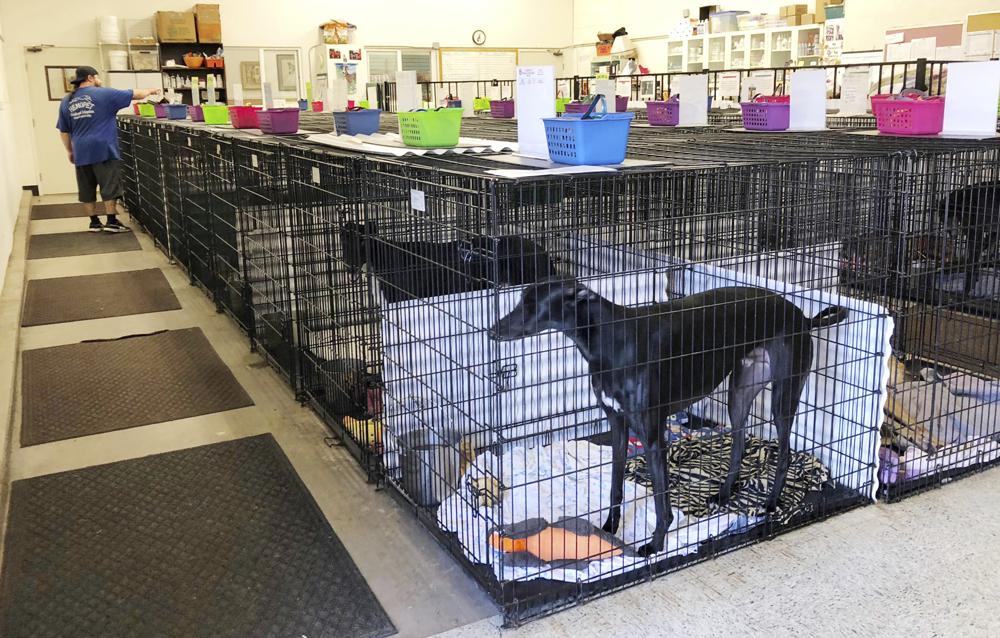

California on Saturday enacted a law aimed at phasing out one of the nation’s large canine blood banks and the practice of keeping dogs in facilities while their blood is drawn.
Gov Gavin Newsom signed a law to let veterinarians run community blood banks where residents can take their pets to donate blood and that can sell and transfer the blood supplies to clinics that need it. The law also creates a plan to phase out closed colony banks where dogs are kept in facilities while their blood is repeatedly drawn.
The shift comes as canine blood supplies are in demand in California for dogs that fall ill or need emergency surgeries. While community banks are common in other states until now they were not allowed in California, which has only permitted closed colony operations or let veterinarians draw blood from pets at their own clinics.
Animal rights activists have long opposed the use of closed colony banks, saying they want dogs living in homes with caring families and not cooped up in facilities. They pressed for change several years ago. The legislature passed a bill to introduce community canine blood banking, but Newsom vetoed it, saying it didn’t go far enough to phase out the practice of keeping donor dogs in facilities.
The new law, known as AB1282, requires the state to phase out closed colony banks 18 months after officials determine that community banks are selling at least as much canine blood as the closed banks sold in a year.
“Whether you are talking about a greyhound who was run on tracks in the South or a dog who has been homeless on the streets, you want these animals to live in a home with a loving family,” said Daniel Paden, vice president of the animal rights group PETA. “If they’re physically and behaviorally healthy, and amenable to going to the vet to donate, then it’s a remarkable service to provide to other dogs.”
Three years ago, People for the Ethical Treatment of Animals filed a complaint with the state alleging that 200 greyhounds kept at a closed colony blood bank in Orange County were being mistreated. The non-profit bank, known as Hemopet, said the dogs were rescued from the racing industry and well cared for while they participated in a blood donor program for 10 months before they were placed in screened adoptive homes.
A message left for Hemopet was not returned. On its website, the group says closed colony banks can ensure a steady and clean blood supply for dogs, and its donors don’t carry infectious diseases. The site also said that Hemopet takes good care of its dogs and works with greyhounds because they are considered universal blood donors that can give to all dogs regardless of blood type.
Hemopet is one of two commercial blood banks licensed in California. A message left for Animal Blood Resources International was not returned.
Animal rights groups and veterinary experts have said community canine blood banking can be done safely with modern veterinary science. The California Veterinary Medical Association, which has nearly 8,000 members, approved of the bill once a process was established to smooth the transition to the new system while ensuring adequate blood supplies, said Dr. Grant Miller, the association’s director of regulatory affairs.
Already, the demand for blood supplies is high and has been increasing each year as residents seek out more treatment options for their pets, he said.
“The role of animals in society has changed in the past few decades, and they’re truly members of the family,” he said, adding residents “want to do whatever they can to help their pets.”
Judie Mancuso, founder of Social Compassion in Legislation, said animal rights groups have long wanted to phase out closed banks but recognized the need for a transition period. Under the new law, state officials will assess when community banking has generated sufficient blood supplies to do so, she said.
“We don’t know how many veterinarians or businesses are going to open up. There’s just no crystal ball,” she said. “We don’t know, but at least we change the law to open the door.”